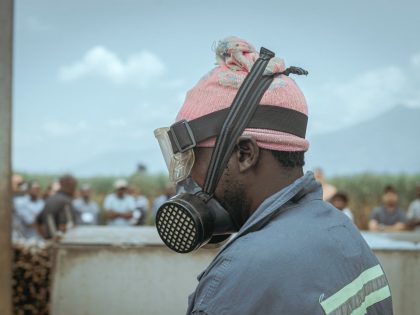
Kenya’s electoral authoritarianism
The former Chief Justice of Kenya on why only a popular movement to defend the constitution can counter corruption and inequality.

The former Chief Justice of Kenya on why only a popular movement to defend the constitution can counter corruption and inequality.

African intellectuals are calling for a different discussion. Isn’t this the right time to propel changes that have often been postponed?

Tunaanza uchambuzi wetu kuhusu ubepari jijini Nairobi tukiuliza: Je, kuna kitu kama mshahara mzuri siku hizi?

We start our project on capitalism in Nairobi by asking: Is there such a thing as a decent wage anymore?

Sugar has become the new gold in Tanzania as prices for the commodity soar and stocks vanish.

We need swift, bold, and decisive action on debt relief and monetary creation in Africa in order to face the coronavirus crisis and prevent many ordinary Africans from paying with their lives.

The South African government's COVID-19 "rescue plan" is an opportunity to rethink its economic model, if it can break with market orthodoxy.

Reflections from New Orleans, Louisiana—the US's most African city—on the economic fallout from the coronavirus pandemic.

South Africa's R50bn ($26bn) rescue package is 10% of its GDP. It is a major step forward, but some warning lights are flashing.

Will the coronavirus pandemic extend Museveni’s authoritarianism or the lockdown instead provide openings for Uganda’s opposition?

The Ramaphosa Presidency has been praised for its handling of the coronavirus pandemic, but the compensating measures that accompany it are inadequate to protect much of the population.

Thandika Mkandawire (1940-2020) bravely stood up for social policies and the developmental state.

A new effort to block chocolate imports from Cote d’Ivoire to the US brings attention to cocoa’s problematic supply chain.

With 7.9 million young South Africans out of work or with very little education or training opportunities, who looks out for their aspirations?

Are plans for ‘reform’ of West African currency, fueled by anticolonial sentiment, merely ‘rebranding’ the status quo?

The question is not how, or where, or when neoliberalism will end, but if it will, and what the left will do about it. The case of South Africa is instructive.

Mobile-phone-based, person-to-person payment and money transfer systems are innovative—but are they really good for poverty reduction and development?

Medical anthropologist Julie Livingston argues that the conditions of capitalist modernity in which we live are not sustainable and are leading to increased rather than lessened inequality.

The winners of the Nobel Prize in Economics experiment on the poor, but their research doesn't solve poverty.

In Africa, the consequences of the growth-at-all costs model are starting to reveal themselves, and they're not pretty.